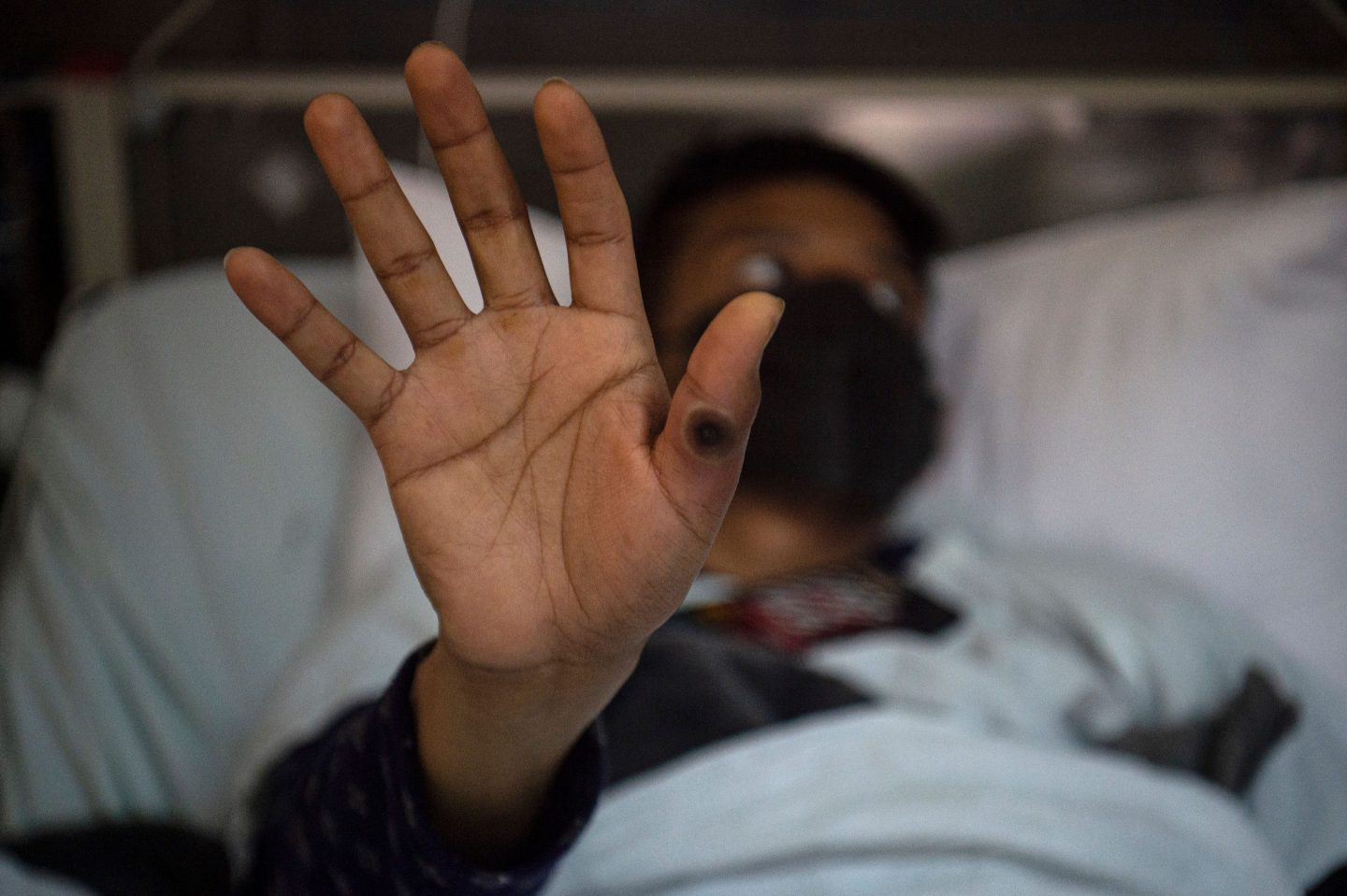
世界卫生组织官员周三表示,已出现猴痘“突破性”感染病例,并确认猴痘疫苗并不是许多人所希望的“灵丹妙药”。
世卫组织猴痘技术主管罗莎蒙德·刘易斯博士在新闻发布会上表示,突破性感染病例“向我们提供了重要信息,证明疫苗并非在任何情况下都是100%有效的。”
刘易斯表示,突破性感染者是在接种疫苗后接触高风险者,或者在接触高风险者之后接种疫苗来防止感染。
刘易斯称,最常用于预防猴痘的疫苗是天花疫苗Jynneos。虽然与该疫苗有关的数据很少,但上世纪80年代从研究中取得的有限数据表明,天花疫苗对猴痘的防御力只有约85%。目前没有特别针对猴痘的疫苗。
刘易斯表示:“我们从最开始就很清楚,疫苗并非灵丹妙药,人们对它的所有期待将会落空。”
她补充说,如果人们感觉面临高风险,并且希望降低风险,可以减少性伴侣的数量,避免群体和/或随意性行为。
世卫组织官员周三表示,自1月以来,全球共报告猴痘病例超过35,000例。已经有12例死亡病例。据美国疾病预防控制中心统计,美国已报告的病例超过13,500例。
世卫组织官员表示,上周,全球共报告近7,500例猴痘病例,较前一周增加了20%,而前一周的报告病例数也比更早一周增加了20%。欧洲和美洲报告的所有病例几乎都是男男性行为者。
本月早些时候,美国食品药品管理局(U.S. Food and Drug Administration)宣布将允许医疗保健提供商向患者少量施打正常剂量的Jynneos疫苗,以缓解疫苗供应不足的压力。
专家表示,目前,该疫苗的施打方式是皮间注射而不是皮下注射,皮间注射能够改善疫苗的效果,从而使减量施打可以接受。
美国食品药品管理局局长罗伯特·卡利夫博士在8月9日的新闻稿中表示:“最近几周,猴痘病毒持续传播,显然我们目前的疫苗供应无法满足当前的需求。增加可用剂量,可以让希望通过接种疫苗预防猴痘的人们有机会接种疫苗。”
新闻稿称,之所以授权这种非传统的施打方法,是因为目前在全球传播的病原体“有极大的可能影响国家安全,或生活在海外的美国公民的健康和安全。”
当时并不确定减量施打皮间注射疫苗是否会增加出现突破性病例的风险,但专家们表示,以这种方式减量施打疫苗,可能比以传统方式全剂量施打疫苗更有效。(财富中文网)
翻译:刘进龙
审校:汪皓
世界卫生组织官员周三表示,已出现猴痘“突破性”感染病例,并确认猴痘疫苗并不是许多人所希望的“灵丹妙药”。
世卫组织猴痘技术主管罗莎蒙德·刘易斯博士在新闻发布会上表示,突破性感染病例“向我们提供了重要信息,证明疫苗并非在任何情况下都是100%有效的。”
刘易斯表示,突破性感染者是在接种疫苗后接触高风险者,或者在接触高风险者之后接种疫苗来防止感染。
刘易斯称,最常用于预防猴痘的疫苗是天花疫苗Jynneos。虽然与该疫苗有关的数据很少,但上世纪80年代从研究中取得的有限数据表明,天花疫苗对猴痘的防御力只有约85%。目前没有特别针对猴痘的疫苗。
刘易斯表示:“我们从最开始就很清楚,疫苗并非灵丹妙药,人们对它的所有期待将会落空。”
她补充说,如果人们感觉面临高风险,并且希望降低风险,可以减少性伴侣的数量,避免群体和/或随意性行为。
世卫组织官员周三表示,自1月以来,全球共报告猴痘病例超过35,000例。已经有12例死亡病例。据美国疾病预防控制中心统计,美国已报告的病例超过13,500例。
世卫组织官员表示,上周,全球共报告近7,500例猴痘病例,较前一周增加了20%,而前一周的报告病例数也比更早一周增加了20%。欧洲和美洲报告的所有病例几乎都是男男性行为者。
本月早些时候,美国食品药品管理局(U.S. Food and Drug Administration)宣布将允许医疗保健提供商向患者少量施打正常剂量的Jynneos疫苗,以缓解疫苗供应不足的压力。
专家表示,目前,该疫苗的施打方式是皮间注射而不是皮下注射,皮间注射能够改善疫苗的效果,从而使减量施打可以接受。
美国食品药品管理局局长罗伯特·卡利夫博士在8月9日的新闻稿中表示:“最近几周,猴痘病毒持续传播,显然我们目前的疫苗供应无法满足当前的需求。增加可用剂量,可以让希望通过接种疫苗预防猴痘的人们有机会接种疫苗。”
新闻稿称,之所以授权这种非传统的施打方法,是因为目前在全球传播的病原体“有极大的可能影响国家安全,或生活在海外的美国公民的健康和安全。”
当时并不确定减量施打皮间注射疫苗是否会增加出现突破性病例的风险,但专家们表示,以这种方式减量施打疫苗,可能比以传统方式全剂量施打疫苗更有效。(财富中文网)
翻译:刘进龙
审校:汪皓
“Breakthrough” cases of monkeypox are being reported, World Health Organization officials said Wednesday—confirming that the vaccine used to fight it isn’t the “silver bullet” many had hoped for.
Such cases provide “important information that tells us the vaccine is not 100% effective in any given circumstance,” Dr. Rosamund Lewis, the WHO’s technical lead on monkeypox, said at a press conference.
Breakthrough infections have occurred when the vaccine was given before exposure to high-risk individuals, as well as when it was given after exposure in hopes of preventing infection, Lewis said.
While data on the vaccine most commonly used against monkeypox, smallpox vaccine Jynneos, is sparse, limited data from studies in the 1980s suggested that smallpox vaccines are only about 85% effective against monkeypox, Lewis said. There is no vaccine available specifically for monkeypox.
“We have known from the beginning this vaccine will not be a silver bullet and meet all the expectations put on it,” Lewis said.
Those who feel they’re at heightened risk and wish to lower that risk level can reduce their number of sex partners and avoid group and/or casual sex, she added.
More than 35,000 cases of monkeypox had been reported globally since January, WHO officials said Wednesday. There had been 12 deaths. Reported U.S. cases were at just over 13,500, according to the U.S. Centers for Disease Control and Prevention.
Globally, nearly 7,500 cases were reported last week—a 20% increase over the previous week, which was a 20% increase over the week before, according to WHO officials. Almost all cases are being reported in Europe and the Americas among men who have sex with men.
Earlier this month the U.S. Food and Drug Administration announced it would allow health care providers to administer a fraction of the normal dose of Jynneos to patients in a bid to stretch limited vaccine supply.
The vaccine is now to be administered between layers of skin versus under the skin, a technique that improves effectiveness, making a smaller dose acceptable, experts say.
“In recent weeks the monkeypox virus has continued to spread at a rate that has made it clear our current vaccine supply will not meet the current demand,” FDA Commissioner Dr. Robert Califf said in an Aug. 9 news release. “By increasing the number of available doses, more individuals who want to be vaccinated against monkeypox will now have the opportunity to do so.”
The authorization of a nontraditional route of administration was issued because the now globally circulating pathogen “has a significant potential to affect national security or the health and security of United States citizens living abroad,” according to the release.
It was not immediately clear if the administration of smaller doses of vaccine between layers of skin would increase the risk of breakthrough cases, though experts say reduced doses delivered in such a manner could be more effective than whole doses delivered in the traditional manner.






